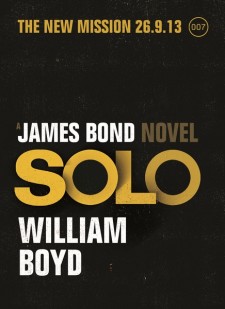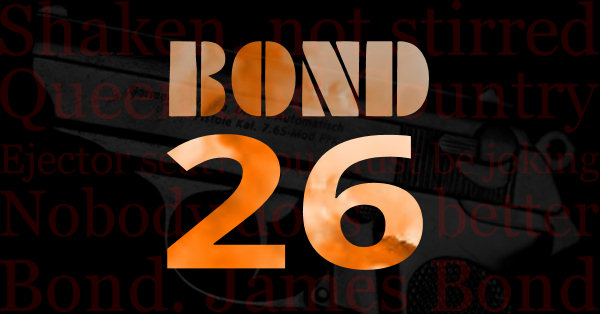On Monday it was announced that the next James Bond novel, written by William Boyd, was to be called Solo.
 Boyd explained the title: saying “events conspire to make Bond go off on a self-appointed mission of his own, unannounced and without any authorization” and “as soon as I wrote down Solo on a sheet of paper I saw its potential. Not only did it fit the theme of the novel perfectly, it’s also a great punchy word” and “it’s strangely Bondian in the sense that we might be subliminally aware of the ’00’ of ‘007’ lurking just behind those juxtaposed O’s”.
Boyd explained the title: saying “events conspire to make Bond go off on a self-appointed mission of his own, unannounced and without any authorization” and “as soon as I wrote down Solo on a sheet of paper I saw its potential. Not only did it fit the theme of the novel perfectly, it’s also a great punchy word” and “it’s strangely Bondian in the sense that we might be subliminally aware of the ’00’ of ‘007’ lurking just behind those juxtaposed O’s”.
The title leapt out at me (and a number of other online Bond commentators) immediately. While Boyd had mentioned several reasons for calling his book “Solo”, he failed to mention a link to Ian Fleming, and if he is unaware of that link (rather than wanting to avoid signaling a plot device) it is a monumental gap in his research.
Enter (and exit) Mr Solo
- Ian Fleming wrote Goldfinger in 1958 and published a year later; one of the characters, who attends Goldfinger’s “hoods’ congress”, is called Mr Solo.
- Ian Fleming worked on a TV project that was to be called “Solo” with the principal character named Napoleon Solo. However, Cubby Broccoli and Harry Saltzman convinced him to sell his rights in the project for £1 as they saw a conflict of interest with their film series; this must have been 1963 based on a quick glance at Andrew Lycett’s biography of Ian Fleming, which would place the event after the release of Dr No and during filming of From Russia With Love).
- Broccoli and Saltzman took legal action to try and prevent the television series from going ahead; while that action failed, the series was renamed The Man From UNCLE and first aired in 1964.
- When Broccoli and Saltzman came to film Goldfinger they took a swipe at The Man From UNCLE; when Mr Solo walks away from “Operation Grandslam” Goldfinger sees to it that he comes to a sticky end. In the book (and early draft of the film) it was Mr Springer who suffered this fate and the change to Mr Solo was almost certainly aimed squarely at the TV series (thanks to the HMSS Weblog for pointing that out to me on Twitter, and the HMSS Weblog’s articles about the issue can be found here and here).
While it would be unfair to judge the book until it is released in September, this wouldn’t be the first time that a continuation author has messed in research; while Jeffery Deaver sidestepped the issue completely by rebooting James Bond to the modern era, Sebastian Faulks overlooked part of Bond’s history in Devil May Care despite getting so many of the other details right.
This time it’s personal (again!)
One aspect of Solo that appears to lack promise, thanks to it being a massively overused plot device in the film series, is Bond going on a “self-appointed mission of his own”, or as the HMSS Weblog tweeted, “This time it’s personal!”
I’ve tallied this up before, but a quick runthrough of “Bond goes rogue” from memory would be: On Her Majesty’s Secret Service, Moonraker, Licence To Kill, Die Another Day, Casino Royale, Quantum of Solace and Skyfall; that’s right, the last four Bond films all include an element of rogue Bond.
The dark continent
The Book Bond also quotes Boyd as saying “He goes on a real mission to real countries and the world he’s in is absolutely 1969. There are no gimmicks, it’s a real spy story. . . there is a very precise reason why I chose that year”.
A year ago Bond Memes speculated on the 1969 date, adding further thoughts later here about how the novel might be set in Africa (now confirmed) due to Boyd’s upbringing in Nigeria and that we might see the Biafran war mentioned; is this in fact the reason for the 1969 date?
We’ll find out the answer to that and all other questions that arise in September.
Pre-order “Solo” from the links below:










